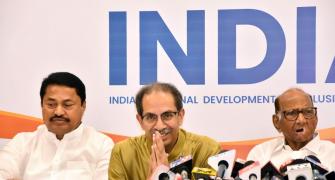The controversial India-United States nuclear agreement has not come in for much debate in the ongoing 19th Communist Party of India-Marxists's Congress as the party feels it had talked enough on the subject.
"We have made our stand very clear on this issue and our delegates were really fed up discussing it over and over again," a senior CPI-M leader told UNI.
The issue did come up for discussion when the political resolution was taken up for debate but was only briefly touched upon.
Interestingly, contrary to expectations, there was not a separate resolution on the Indo-US nuclear deal.
The political resolution adopted on Tuesday after a marathon discussion lasting for two sessions did not have a single line on the nuke issue.
"We have made it clear that the deal should go and we are convinced that it is off for all practical purposes," the leader said, adding, "The United Progressive Alliance government is shying away from making a formal announcement that the deal has gone," sources said.
"Those who advocate the deal should know that India is capable of developing nuclear energy primarily on a self-reliant basis. They must also realise that the deal with the US will go against the interests of India," he said.
Without directly mentioning the deal, CPI-M general secretary Prakash Karat said the party would launch a struggle to defend the sovereignty of the country and mobilise democratic forces to thwart the US' imperialist design to convert India into its strategic ally.
The party was in no mood to give an ultimatum to the Congress-led UPA government on the issue as it was not interested in destabilising the government and allow the Bharatiya Janata Party to take any advantage.
CPI-M politburo member Sitaram Yechury, while addressing the Bar Association in Coimbatore, made it clear that the party was interested only in stopping the deal and not in destabilising the government. The deal is not only 'dangerous', but also unacceptable, he added.
Referring to Prime Minister Manmohan Singh's statement that the country required an additional 40,000 MWe and that this demand would be met through nuclear reactors, Yechury said for generating 30,000 MWe, the country should import nuclear reactors and the cost of production, at Rs 11 crore per MWe, would be Rs 3,30,000 crore.
In comparison, the cost of hydro-electric generation and natural gas per mega watt would be Rs three crore, while thermal power through coal would cost Rs 4 crore, he said.
There would be a huge divide between the 'Shining India and Suffering India' due to the deal, Yechury said, adding the Hyde Act would endanger India's independence in terms of foreign policy, defence policy and strategic alliance in the region.
As per the Hyde Act, access to dual nuclear technologies, applicable in both civil and defence-related areas, would not be available to India, he pointed out.
Yechury said the committee, comprising representatives of the UPA and the Left, would meet in April and based on its findings, a decision on the deal would be taken.







